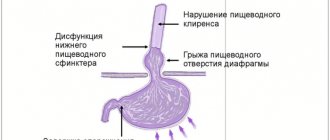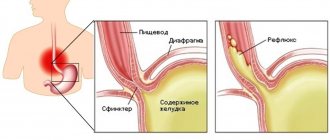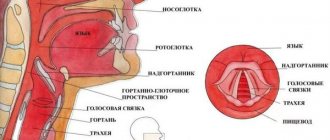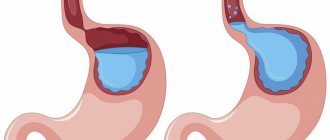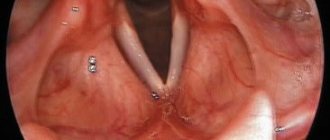Gastroduodenitis is a disease in which the pyloric part of the stomach and the mucous membrane of the duodenum become inflamed. This is one of the most common pathologies of the digestive tract. Both external and internal factors can lead to its development.
In its manifestations, the disease is similar to the clinical picture of chronic gastritis. Gastroduodenitis can be the result of poor nutrition, overwork, bad habits or stressful situations. The hereditary factor plays an important role in the formation of the inflammatory process.
The disease occurs in both adults and children. Often patients are bothered by bitter belching and heartburn. The acute process is accompanied by the appearance of the following symptoms: a painful outbreak in the navel area or under the ribs, constipation, fever, pale skin.
The chronic form is characterized by sleep disturbance, dizziness, weakness, drowsiness, and excessive sweating. Depending on the nature of the inflammatory process, gastroduodenitis can be superficial, erosive, atrophic and hyperplastic.
Therapeutic tactics include bed rest during an exacerbation, dietary nutrition, drug therapy (enzymes and antibiotics), and physical therapy.
In addition to the therapy prescribed by the doctor, advice from traditional medicine is in demand. Treatment of gastroduodenitis with folk remedies is a good adjuvant that helps speed up recovery. Let's look at which alternative medicine tips are the most effective and talk about precautions.
Gastroduodenitis
Gastroduodenitis is a disease of the gastrointestinal tract, which is characterized by the occurrence of foci of inflammation on the mucous membrane of the stomach and duodenum.
The pathology is considered one of the forms of chronic gastritis. The duodenum is involved secondarily during the spread of the inflammatory process from the mucous membrane of the pyloric part of the stomach. In rare cases, the disease appears against the background of complete well-being and is considered as acute gastroduodenitis.
The disease is classified as follows:
- Taking into account the cause of occurrence, primary and secondary gastroduodenitis are distinguished.
- Based on the presence of Helicobacter pylori - HP-positive and HP-negative gastroduodenitis.
- According to the nature of gastric secretion - with increased, preserved, decreased acidity.
- By prevalence - isolated gastritis, or bulbitis, pangastritis, widespread duodenitis.
- According to the form of the lesion:
- endoscopic picture - superficial, erosive, hypertrophic, hemorrhagic, atrophic gastroduodenitis, as well as duodenogastric reflux;
- morphological picture - superficial, diffuse, atrophic gastroduodenitis.
- According to the period of the disease - exacerbation, incomplete and complete clinical remission, recovery.
Traditional methods for various forms of gastroduodenitis
Let's look at the common forms of the disease and find the key to solving the problem.
Surface
It is characterized by the appearance of pain in the epigastric region, which is associated with meals. Hunger pains can bother a person in the morning. Usually, after eating food, the painful outbreaks disappear. With increased acidity, pain may appear at night. There is bitterness in the mouth, flatulence, weakness, increased fatigue, and lethargy.
Folk remedies will help correct the condition in chronic forms. Usually in this case, medications are unsuccessful, and there are no side effects from using unconventional advice.
Let's consider three options for preparing herbal infusion:
- You will need to take pharmaceutical chamomile, St. John's wort and yarrow. All ingredients are taken in equal proportions, after which the dry raw materials are poured with boiling water on the basis that there is a glass of water per tablespoon of plants. The product should be infused for half an hour, then it should be strained. Should be taken thirty minutes before meals for two weeks.
- This recipe will require more ingredients: chamomile, cudweed, cumin, yarrow, knotweed, dill seeds, valerian root, hops. Dry raw materials are poured with boiling water and allowed to brew overnight in a thermos. It should also be taken half an hour before meals.
- Take viburnum, aloe juice, chaga and honey. Half a glass of viburnum is poured with three liters of water and brought to a boil. After a day, add two glasses of chaga and put it in the refrigerator for two days. At the end you should add a glass of honey and half a glass of aloe juice. Take half a glass three times a day.
Herbal remedies relieve discomfort during gastroduodenitis
Erosive
It is characterized by damage to the mucous membrane and the formation of erosions on its surface. The pathological process can last for years. The disease can be provoked by alcohol abuse, taking medications on an empty stomach, infectious processes and much more. The erosive form manifests itself in the form of heartburn, nausea, heaviness, aching pain, lack of appetite, and anemia.
Let's talk about effective recipes used to treat erosive gastroduodenitis:
- sea buckthorn oil. The product can be bought at a pharmacy or prepared yourself. The juice should be squeezed out of the berries, and the skins and seeds should be dried in the oven. Then pour the product with olive oil in equal proportions. The product must infuse for three weeks. It must be stored in a cool, dark place. The oil is good for relieving pain. It is enough to take a tablespoon of the product inside and eat it with a piece of dried rye bread;
- propolis. Twenty drops of propolis tincture should be diluted in 500 ml of water. Should be taken thirty minutes before meals for three weeks;
- aloe or agave juice. You should use freshly squeezed juice and mix it in equal proportions with honey. A tablespoon of the mixture is taken twenty minutes before meals;
- mint and centaury. Pour two tablespoons of the herbal mixture into a glass of boiling water. The product should be infused for one hour in a thermos, after which it should be filtered. You should take a glass half an hour before meals.
Atrophic
This is a chronic process that experts consider a precancerous condition. The cause of atrophic changes in the mucous membrane may be Helicobacter pylori infection or sluggish gastritis. The disease is characterized by mild clinical symptoms. Patients complain of aching and nagging pain above the navel, hunger pain, heaviness in the epigastrium, nausea, vomiting, heartburn, bloating, constipation or diarrhea.
Alternative treatment will help restore the functioning of the mucous membrane
As a complement to drug therapy, non-traditional recipes can be used to relieve symptoms. Take a tablespoon of flax seeds and boil them for five minutes. Then the product should infuse for two hours. The strained product is taken one tablespoon before meals.
Rose hips will help reduce the manifestation of gastroduodenitis. Take the leaves or fruits of the plant and pour a glass of boiling water over them. Next, the solution should be boiled and filtered. For a month, the decoction should be drunk 100 g three times a day.
The use of potato juice gives good results. Half an hour before meals, it is recommended to take half a glass of freshly squeezed juice. The product will help relieve pain with increased secretory function.
Hyperplastic
The disease is characterized by changes in acidity, proliferation of the mucous membrane and the formation of growths. The insidiousness of this form lies in the absence of pronounced symptoms at the onset of the disease and the risk of degeneration of formations into a malignant form. As the process progresses, loss of appetite, belching, and stool retention occur.
For hyperplastic gastroduodenitis, it is recommended to take an infusion of St. John's wort. A tablespoon of dry plant is poured with a glass of boiling water. Then the product is allowed to brew for two hours in a thermos. The strained infusion is taken 250 ml in the morning and evening on an empty stomach.
It is also useful to use an infusion based on burdock. A tablespoon of the product is poured into two glasses of boiling water and left in a thermos overnight. Half a glass of infusion should be taken in the morning on an empty stomach and before each subsequent meal.
Sea buckthorn oil will help restore the functional properties of the mucous membranes. With low acidity, it is useful to drink juice from fresh berries.
So, gastroduodenitis is an inflammatory disease, which in most cases develops against the background of poor nutrition and bad habits. The pathological process is characterized by the appearance of unpleasant symptoms, including epigastric pain, heartburn, heaviness, and attacks of nausea. Traditional treatment does not replace drug therapy, but is a complement to it. Before you start using unconventional methods, consult your doctor.
Causes of gastroduodenitis
The etiological factors for the development of the disease include:
- Heredity
- Unbalanced diet (lack of regular meals, insufficient fluid intake, excess alcohol, rough, hot, spicy foods)
- Intestinal infectious diseases
- H. pylori infection
- Chronic inflammatory process in the oral cavity, pharynx
- Diseases of the hepatobiliary system
- Long-term use of medications (a number of antibacterial drugs, acetylsalicylic acid)
- Chronic stress
- Smoking
Mint for gastroduodenitis
The plant has valuable medicinal properties.
Useful qualities of mint:
- Reduces the intensity of inflammation due to its antiseptic and antibacterial properties;
- Stimulates the digestion of food, as it has a choleretic effect;
- Relieves pain by having an antispasmodic effect on the smooth muscles of the intestines;
- Gently relieves stress and psycho-emotional stress, having a sedative effect.
Mint infusion is an effective remedy for the treatment of gastroduodenitis. To prepare it, brew 1/2 cup of fresh or dried mint leaves in a thermos, pouring 1 liter of water overnight. The first dose of infusion is 100 ml after waking up, then take 1/2 glass of infusion before each meal.
Find out more:
Properties and uses of peppermint
Symptoms of gastroduodenitis
Acute gastroduodenitis clinically manifests itself in the form of severe cramping pain localized in the epigastric zone in combination with the following symptoms:
- nausea, vomiting
- feeling of heaviness in the stomach area
- heartburn, belching of air or sour contents
- stool disorders
- decreased or complete lack of appetite
In case of a previously diagnosed disease with a chronic course, exacerbation of gastroduodenitis is accompanied by the following manifestations:
- feeling of fullness in the stomach area
- regular occurrence of aching pain in the epigastric region on an empty stomach and for several hours after eating
- nausea, heartburn
- presence of white coating on the tongue
- bitter or metallic taste in the mouth
- discomfort or moderate pain on palpation
- stool disorders
- fatigue, irritability, weight loss
The most effective recipes
An integrated approach will help cure gastroduodenitis. Follow all the doctor’s recommendations and you will forget about the disease once and for all. If you decide to use traditional methods, be sure to undergo an examination and ask your doctor whether certain methods can be used specifically in your case.
Peppermint and celandine
Fresh mint combined with dry herbs is poured with boiling water. The product should sit all night. You should take half a glass in the morning before meals, as well as at lunch and before dinner. You can also prepare a tincture of celandine. To do this, it is mixed with alcohol in a 1:2 ratio.
The product should be infused for two weeks. You should start with five drops, adding one drop daily. After you reach fifty drops, you should reduce the dosage in the opposite direction every day. The course of treatment is three months.
Medicinal herbs
Herbs are used for both medicinal and preventive purposes. You can prepare a gastric collection based on the following components:
- calamus root;
- plantain;
- St. John's wort;
- blooming Sally;
- yarrow;
- Melissa.
There is another recipe, which includes the above ingredients, to which are added wild strawberry leaves, dill seeds, rose hips, and valerian root. Both options promote wound healing, suppress fermentation processes, eliminate belching and heartburn, and also normalize the functioning of the gastrointestinal tract.
Traditional recipes for gastroduodenitis are used with the permission of the doctor
Diagnosis of gastroduodenitis
The examination is carried out by a gastroenterologist. To make a diagnosis you need:
- Questioning and collection of anamnesis, including information about possible provoking factors for the development of pathology and concomitant diseases.
- Examination with a detailed study of the condition of the oral cavity, upper abdomen, palpation.
- Endoscopic examination. Esophagogastroduodenoscopy allows you to assess the condition of the mucous membrane of the stomach and duodenum, determine the extent and extent of the lesion.
- Biopsy with histological examination. Reflects the activity of inflammatory processes, the presence of atrophy, atypical cells.
- pH-metry to assess the secretion of gastric juice.
- Breath or invasive test to detect H. pylori.
Additionally, an X-ray examination of the stomach and ultrasound of the abdominal organs can be performed.
Folk remedy for gastroduodenitis
The best remedy that effectively treats inflammation of the stomach and intestines is a mixture of honey, butter, carrots and walnuts.
Compound:
- Honey – 500 g,
- Ghee butter – 500 g,
- Chopped walnuts – 500 g,
- Finely grated carrots – 500 g.
Mix all ingredients, put in a jar, and store in the refrigerator. Therapeutic dose: 20 minutes before meals, take 1 tablespoon. The course of treatment lasts until the remedy runs out. After consuming this tasty and healthy remedy, gastroduodenitis should go away.
Diet
General principles of proper nutrition in cases of dysfunction of the digestive tract include:
- Frequent meals of moderate temperature in small portions without swallowing hard or large pieces.
- Exclusion of spicy, fried, salty, smoked, alcohol, carbonated drinks.
- Consumption of vegetable soups and non-concentrated broths, lean boiled meat and fish, lactic acid products, eggs, boiled porridges, stale and unhealthy bread, boiled or raw grated vegetables and fruits.
Treatment of gastroduodenitis with onion jam
To prepare the product you need to take 1 kg of onion and 1 kg of sugar. Chop the onion as finely as possible, mix it with sugar in an enamel bowl. After 5-10 minutes, the onion will give juice. Heat the pan with onions and sugar over low heat for 30-40 minutes until golden brown.
Transfer the onions boiled in sugar into a jar, take 1 tbsp. l.s. 2-3 times a day on an empty stomach.
A diet is mandatory for this treatment. The drug Omez or Omeprazole, prescribed by a doctor, is taken 1-2 capsules a day half an hour before meals along with onion jam. After 2 weeks of examination, you can see a clear effect of the treatment.
Video about preparing a recipe with onions and sugar:
Drug treatment
The list of medications includes:
- antibiotics for diagnosed H. pylori infection;
- antisecretory drugs for the form with high acidity;
- antacids to relieve heartburn;
- if indicated - antispasmodic and enzyme preparations, vitamins, reparation stimulants, sedatives and herbal remedies.
Complex treatment of the disease continues for several weeks. If symptoms are severe, it is recommended to begin therapy in a hospital followed by continuation on an outpatient basis.
Treating the stomach with raw potatoes
In case of exacerbations or heartburn attacks, there is no need to squeeze potato juice and drink it; it is better to use grated potatoes. The benefits of raw potatoes were proven by the Institute of Health in 1956.
Take red potatoes with yellow flesh (100 g), grate them on a fine grater. Before treatment, be sure to drink 300 ml of hot water in large sips to rinse the mucous membrane from the secretions covering it. After 15 minutes, eat the grated potatoes, swallowing them in small portions. You should not chew potatoes or mix them with saliva. You cannot eat for an hour; after an hour you can eat porridge with water. The course of treatment lasts 10 days, during which time you need to follow a diet, eating light meals.
Video about the process of preparing a medicinal product from grated potatoes:
Popular questions about gastroduodenitis
What medications should I take for gastroduodenitis?
Treatment is prescribed strictly by a doctor. The treatment regimen is developed taking into account the etiology, clinical manifestations of the disease, results of laboratory and instrumental research methods. It may include antibacterial and antisecretory agents, antacids, antispasmodics, enzymes, sedatives and other drugs.
How does the stomach hurt with gastroduodenitis?
When the acute form manifests itself, there is severe cramping pain in the upper abdomen, mainly in the epigastric region.
Chronic gastroduodenitis is accompanied by pain of moderate intensity. The aching pain is localized in the epigastric region and is associated with food intake.
What should you not eat if you have gastroduodenitis?
When a diagnosis is made, the patient should avoid eating fried, salted, smoked foods, canned food, spicy spices, alcoholic and carbonated soft drinks, and spices. Fruit and vegetable juices, teas, coffee, cabbage, cucumbers, onions and green onions are not recommended.
General principles of home treatment
Usually, the use of non-traditional recipes is resorted to in non-advanced forms of gastroduodenitis. Medicinal herbs are recommended to be brewed during an exacerbation. All treatment methods for the inflammatory process should be aimed at achieving the following goals:
- normalization of acidity;
- elimination of excess formation of hydrochloric acid;
- reduction of painful outbreaks and discomfort;
- relieving the inflammatory reaction;
- normalization of appetite;
- fight against heartburn and nausea.
In case of gastroduodenitis, first of all, you should establish nutrition, no matter how good the treatment, due to errors in the choice of dishes, everything can go down the drain
Let's talk about the general principles of therapeutic nutrition for gastroduodenitis:
- Chew your food thoroughly. It’s not for nothing that there is an expression that you need to drink food and eat water. This suggests that solid food should be thoroughly crushed before swallowing;
- Food should be consumed warm. You should avoid eating too hot or, conversely, cold foods;
- fractional meals with small portions;
- sufficient consumption of natural water;
- avoidance of foods that can irritate the inflamed membrane;
- It is better to cook, stew or bake foods.
If you have gastroduodenitis, you should avoid the following foods:
What to drink if your stomach hurts?
- fat;
- roast;
- canned;
- pickled;
- baking;
- coffee;
- sauces;
- radish;
- White cabbage;
- spinach.
If you have gastroduodenitis, you can’t fast, it’s better to eat at the same time
Helicobacter
The main cause of gastroduodenitis is the microbe Helicobacter, which quickly adapts to antibiotics. Folk remedies cannot remove the pest.
It is useful to take herbs in two cases:
- Heliobacter has already been defeated (remission has been proven by test results).
- The cause of gastroduodenitis is not bacterial.
Doctors say that half of the population of developed countries are carriers of the microbe. In 80% the disease is asymptomatic. The bacterium leads to the formation of ulcers in 10-20% of cases, rarely causes cancer (category I carcinogen). Those infected have an increased risk of developing eye diseases.
The action of Helicobacter
Urea is present in the stomach. Helicobacter uses a special enzyme to decompose the molecule into ammonia and carbon dioxide, alkalizing the environment, and the infection settles on the walls. Inflammation develops.
A kiss is enough for infection.
Treatment of gastroduodenitis
Start treatment with analysis. We present 3 methods that help cure gastroduodenitis:
- Drug treatment has a drawback: the bacterium masters new drugs and changes. Traditional treatment consists of taking the drugs omeprazole, clarithromycin, amoxicillin. If the strain becomes addictive or an allergic reaction occurs, other antibiotics are used.
- A vaccine against Helicobacter was created. There is successful experience of application in the Netherlands. The United States has already become interested in the product.
- Helicobacter is suppressed by lactic acid flora. It is beneficial to consume dairy products.
The effectiveness of butyric acid in removing bacteria has been noted. Pharmacies sell the drugs Nolpaza and De-Nol, which fight against Helicobacter.
Factors in the development of gastroduodenitis and classification
The disease, regardless of the causes that cause it, develops according to a specific scenario - the influence of any factors on the mucous membrane of the affected organs, inflammation, loss of integrity.
When the mucosa is damaged, it cannot produce the required amount of substances important for digestion, plus motor function is impaired. The smooth muscles of the organs do not work correctly, which prevents the proper mixing of food with gastric juice. In particular, with gastroduodenitis, motility increases. Gastroduodenitis and gastritis are the most common gastrointestinal diseases, and in some cases the cause of their occurrence is poor nutrition. It is classified as one of the so-called exogenous factors that affect the digestive system from the outside. Malnutrition in the gastroenterological sense includes the consumption of spicy, cold, hot foods, smoked foods, fried foods, and canned food.
Exogenous (primary) factors also include:
- Chemical-toxic effects - non-steroidal anti-inflammatory drugs and drugs that irritate coolant, alcohol, pesticides.
- Entering the body of the bacterium Helicobacter pylori - the bacterium penetrates the gastric mucosa and begins to actively reproduce, causing inflammation, damage and painful symptoms. A person whose stomach is colonized by a bacterium is its spreader. Gastritis and gastroduodenitis caused by this problem have a higher risk of progressing to the cancerous stage. The most common cause, about 80% of all cases of gastroduodenitis are provoked by it.
- Bacteria other than Hp.
- Smoking.
- Radiation.
- Parasites.
- Mushrooms.
- Stress.
Endogenous (secondary) causes include the following:
- increased acid formation;
- reduction in the amount of mucus;
- change in the amount of secreted hormones;
- problems related to the biliary tract and liver;
- pathology of the endocrine system;
- autoimmune damage to the mucous membrane (10-15% of all diseases) - antibodies attack their own cells, the likelihood of developing cancer increases by 3-6 times.
Depending on the reasons for which gastroduodenitis was provoked, it manifests itself in different types of abnormalities and inflammation. There are five main types:
- superficial - the mucous membranes of both organs affected by the disease are damaged, but to a small extent and without erosion;
- erosive – the mucous membrane has succumbed to destructive factors;
- hypertrophic - one of the types of manifestations when the mucous membranes thicken and grow;
- atrophic - the reverse type, when the mucous membranes become thinner, and the glands contained in the walls of the organs produce less and less acid necessary for digestion;
- mixed - when several types of the above are combined with each other.
There are also special forms of the disease, provoked by some nonspecific factors that we mentioned above. For example, radiation gastroduodenitis is caused by radiation.
Additionally, when classifying gastritis, the level of acidity (normal/increased/decreased), stages (remission, acute stage), and the presence of complications are assessed. Bleeding or malignancy are observed as complications. In addition, gastroduodenitis can be acute and chronic.
Treatment of gastroduodenitis with flax
For gastroduodenitis, a proven folk remedy based on flax will help you. Take flax and grind it properly, then pour one tablespoon of boiled water into an enamel pan. Place on the fire and after boiling, keep on the fire for another fifteen minutes. Leave for one hour.
You need to take the medicine three times a day, half a glass, an hour before meals. The course of treatment for gastroduodenitis is 4 weeks. Then you need to take a break for ten days and repeat the course of treatment again. So it is necessary to conduct three courses with breaks.
You can also drink the following infusion instead of water: a pinch of each plant - St. John's wort, celandine, chamomile - must be brewed with two liters of water. Helps with polyps and intestinal diseases, as well as stomach ulcers.
Treatment
Treatment is carried out sequentially and includes the establishment of nutritional and physical activity and drug therapy. The method of treating gastroduodenitis is selected depending on the level of acidity. When Hp is detected, antibiotics cannot be avoided. Multivitamins, sedatives, antispasmodics, and mineral waters are also used. The doctor takes into account the peculiarities of the course of gastroduodenitis and the presence of other diseases of the digestive system.
NEARMEDIC offers comprehensive examination and effective treatment in comfortable conditions without queues and at reasonable prices. There are several branches located in Moscow and the cities of the Moscow region, so you can choose the closest and most convenient one. Our advantages:
- a full range of equipment for ultrasound, colonoscopy, gastroscopy with collection of biopsy material;
- own laboratory with reduced time for preparing tests due to lack of workload;
- gastroenterologists with experience in training in European clinics under a contract from NEARMEDIC, specialized education, scientific publications, candidate and doctoral degrees;
- availability of specialists in the field of pediatric gastroenterology;
- an integrated approach to treatment, selection of individual drug combinations according to research;
- comfortable environment - choose a doctor, day and time of appointment, find out test results by phone, call a doctor for a consultation or a laboratory assistant to take samples.
To make an initial appointment, simply call us or fill out the form on the website.
Treatment of chronic gastroduodenitis
Since chronic gastroduodenitis is characterized by a cyclical course of the disease, alternating exacerbations with periods of remission, treatment should be carried out in accordance with the following principles:
- during the acute period, the patient is prescribed bed rest, usually for at least 7-8 days;
- mandatory diet is required. Proper nutrition helps chronic gastroduodenitis respond more quickly to treatment and does not cause too much pain;
- if gastroduodenitis has led to increased stomach acidity, then patients are recommended to take omeprazole and H2 histamine receptor blockers;
- Physiotherapy, health resort treatment and exercise therapy show excellent results.
- To neutralize Heliobacter Pilori, drug therapy is carried out, which consists of taking bismuth tripotassium dicitrate, amoxicillin, macrolides and metronidazole. The treatment course lasts from 7 to 10 days.
In addition to the main medications, the doctor usually prescribes auxiliary agents for gastroduodenitis. The main purpose of these drugs is to reduce the side effects of drugs from the main group.
Among such drugs are antispasmodics, probiotics, vitamin complexes, as well as fixatives or laxatives. The entire course of treatment of gastroduodenitis with medications involves a significant load, which often negatively affects the functioning of other organs. Therefore, people often pay attention to traditional methods of treatment, which can be carried out together with traditional therapy.

